
Microsoft Access is a database management system (DBMS) from Microsoft that combines the relational Access Database Engine (ACE) with a graphical user interface and software-development tools. It is a member of the Microsoft 365 suite of applications, included in the Professional and higher editions or sold separately.
Visual Basic for Applications (VBA) is an implementation of Microsoft's event-driven programming language Visual Basic 6.0 built into most desktop Microsoft Office applications. Although based on pre-.NET Visual Basic, which is no longer supported or updated by Microsoft, the VBA implementation in Office continues to be updated to support new Office features. VBA is used for professional and end-user development due to its perceived ease-of-use, Office's vast installed userbase, and extensive legacy in business.

WordPerfect (WP) is a word processing application, now owned by Alludo, with a long history on multiple personal computer platforms. At the height of its popularity in the 1980s and early 1990s, it was the dominant player in the word processor market, displacing the prior market leader WordStar.
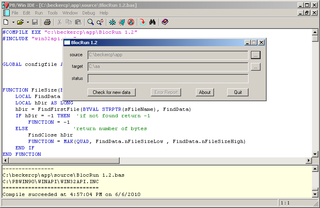
PowerBASIC, formerly Turbo Basic, is the brand of several commercial compilers by PowerBASIC Inc. that compile a dialect of the BASIC programming language. There are both MS-DOS and Windows versions, and two kinds of the latter: Console and Windows. The MS-DOS version has a syntax similar to that of QBasic and QuickBASIC. The Windows versions use a BASIC syntax expanded to include many Windows functions, and the statements can be combined with calls to the Windows API.
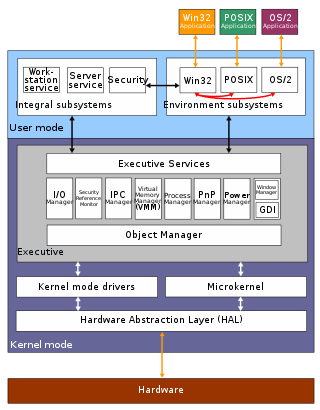
The Windows API, informally WinAPI, is the foundational application programming interface (API) that allows a computer program to access the features of the Microsoft Windows operating system in which the program is running.
Quattro Pro is a spreadsheet program developed by Borland and now sold by Alludo, most often as part of Alludo's WordPerfect Office suite.

Visual Basic (VB), originally called Visual Basic .NET (VB.NET), is a multi-paradigm, object-oriented programming language, implemented on .NET, Mono, and the .NET Framework. Microsoft launched VB.NET in 2002 as the successor to its original Visual Basic language, the last version of which was Visual Basic 6.0. Although the ".NET" portion of the name was dropped in 2005, this article uses "Visual Basic [.NET]" to refer to all Visual Basic languages released since 2002, in order to distinguish between them and the classic Visual Basic. Along with C# and F#, it is one of the three main languages targeting the .NET ecosystem. Microsoft updated its VB language strategy on 6 February 2023, stating that VB is a stable language now and Microsoft will keep maintaining it.
The Visual Component Library (VCL) is a visual component-based object-oriented framework for developing the user interface of Microsoft Windows applications. It is written in Object Pascal.

The Microsoft Windows Script Host (WSH) is an automation technology for Microsoft Windows operating systems that provides scripting abilities comparable to batch files, but with a wider range of supported features. This tool was first provided on Windows 95 after Build 950a on the installation discs as an optional installation configurable and installable by means of the Control Panel, and then a standard component of Windows 98 and subsequent and Windows NT 4.0 Build 1381 and by means of Service Pack 4. The WSH is also a means of automation for Internet Explorer via the installed WSH engines from IE Version 3.0 onwards; at this time VBScript became means of automation for Microsoft Outlook 97. The WSH is also an optional install provided with a VBScript and JScript engine for Windows CE 3.0 and following and some third-party engines including Rexx and other forms of Basic are also available.
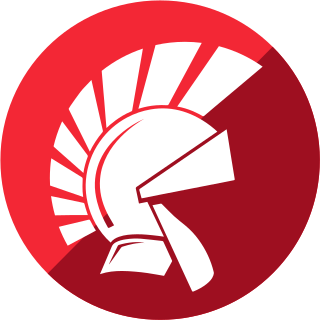
Delphi is a general-purpose programming language and a software product that uses the Delphi dialect of the Object Pascal programming language and provides an integrated development environment (IDE) for rapid application development of desktop, mobile, web, and console software, currently developed and maintained by Embarcadero Technologies.
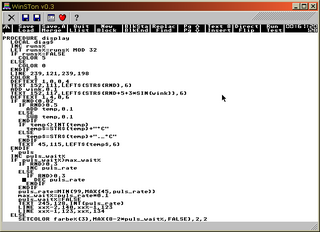
GFA BASIC is a dialect of the BASIC programming language, by Frank Ostrowski. The name is derived from the company, which distributed the software. In the mid-1980s to the 1990s it enjoyed popularity as an advanced BASIC dialect, but has been mostly superseded by several other programming languages. Official support ended in the early 2000s.
DataFlex is an object-oriented high-level programming language and a fourth generation visual tool for developing Windows, web and mobile software applications on one framework-based platform. It was introduced and developed by Data Access Corporation beginning in 1982.
Borland Kylix is a compiler and integrated development environment (IDE) formerly sold by Borland, but later discontinued. It is a Linux software development environment based on Borland Delphi and Borland C++ Builder, which runs under Microsoft Windows. Continuing Delphi's classical Greek theme, Kylix is the name for an ancient Greek drinking cup. The closest supported equivalent to Kylix is the free Lazarus IDE package, designed to be code-compatible with Delphi. As of 2010 the project has been resurrected in the form of Delphi cross compiler for Mac and Linux, as shown in the Embarcadero's Delphi and C++ Builder roadmap. As of September 2011 with Kylix discontinued the framework for cross-platform development by Embarcadero is FireMonkey.
Paradox is a relational database management system currently published by Corel Corporation.
Borland Database Engine (BDE) is the Windows-based core database engine and connectivity software behind Borland Delphi, C++Builder, IntraBuilder, Paradox for Windows, and Visual dBASE for Windows.
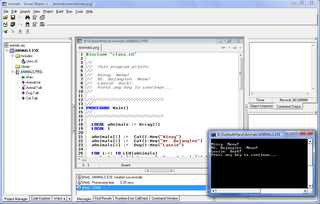
Xbase++ is an object oriented programming language which has multiple inheritance and polymorphism. It is based on the XBase language dialect and conventions. It is 100% Clipper compatible language supporting multiple inheritance, polymorphism, object oriented programming. It supports the xBase data types, including Codeblocks. With Xbase++ it is possible to generate applications for Windows NT, 95, 98, Me, 2000, XP, VISTA and Windows 7, 8, 10.
In Microsoft Windows applications programming, OLE Automation is an inter-process communication mechanism created by Microsoft. It is based on a subset of Component Object Model (COM) that was intended for use by scripting languages – originally Visual Basic – but now is used by several languages on Windows. All automation objects are required to implement the IDispatch interface. It provides an infrastructure whereby applications called automation controllers can access and manipulate shared automation objects that are exported by other applications. It supersedes Dynamic Data Exchange (DDE), an older mechanism for applications to control one another. As with DDE, in OLE Automation the automation controller is the "client" and the application exporting the automation objects is the "server".

JADE is a proprietary object-oriented software development and deployment platform product from the New Zealand-based Jade Software Corporation, first released in 1996. It consists of the JADE programming language, Integrated development environment and debugger, integrated application server and object database management system.

Visual Basic (VB) before .NET, sometimes referred to as Classic Visual Basic, is a third-generation programming language, based on BASIC, and an integrated development environment (IDE), from Microsoft for Windows known for supporting rapid application development (RAD) of graphical user interface (GUI) applications, event-driven programming and both consumption and development of components via the Component Object Model (COM) technology.
This page details the history of the programming language and software product Delphi.








